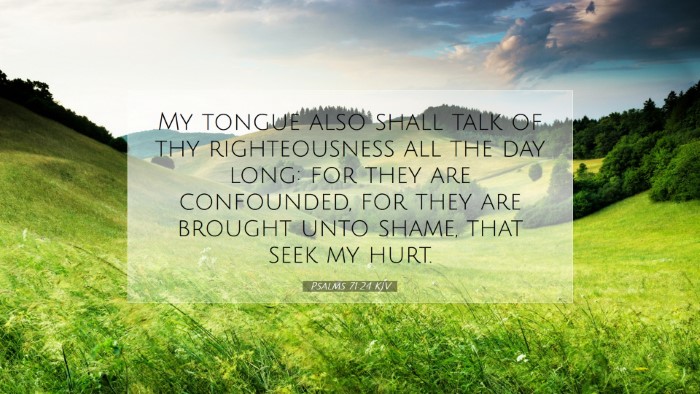Psalms 71:24 - A Deep Dive into the Commentary
Verse: "My tongue also shall talk of thy righteousness all the day long: for they are confounded, for they are brought unto shame that seek my hurt."
Introduction to Psalms 71:24
This verse, set within the rich tapestry of Psalm 71, speaks to the psalmist's deep commitment to proclaiming God's righteousness. As believers, we are reminded of our calling to testify about the goodness and justice of the Lord, especially in moments of distress.
Context and Structure
The entire psalm is a plea for God's help and an affirmation of trust. This specific verse encapsulates the theme of divine justice against those who oppose God's faithful servants.
- Personal Reflection: The psalmist uses the first person to personalize the call to proclaim righteousness.
- Contrast: The verse contrasts the righteous—with the intention to speak of justice—and the wicked, who are ultimately confounded.
Commentary Insights
Drawing insights from various public domain commentaries, the richness of this verse unfolds through multiple theological lenses.
Matthew Henry’s Perspective
Matthew Henry highlights the psalmist's resolve to keep God’s righteousness at the forefront of his speech. He notes that righteousness is both a divine attribute and a standard for human conduct. Henry emphasizes that in discussing righteousness, the psalmist combats the shame and disgrace that the enemies have attempted to impose. This intention fills the psalmist with hope and perseverance, for he is assured that while the foes may seek harm, it is ultimately God who vindicates.
Albert Barnes’s Commentary
Albert Barnes expounds on the confidence expressed in the verse. He points to the continuity of the speaker’s praise throughout the day, suggesting that true righteousness is never a solitary act but must be woven into the fabric of daily life. Barnes notes that the statements about enemies being confounded and brought to shame serve as a contrast to the unwavering commitment of the faithful. This serves to reaffirm the idea that those who oppose God’s righteousness will ultimately find themselves in disgrace, while the righteous flourish.
Adam Clarke’s Contribution
Adam Clarke brings attention to the psalmist’s determination to speak of righteousness as a testimony not only to the goodness of God but also as an act of defiance against oppression. He discusses the significance of the tongue as an instrument of declaration that can either uplift or bring about despair. Clarke also delves into the historical context in which this psalm was written, pointing out that the psalmist likely faced persecution, yet remained steadfast in his faith, finding solace in the righteousness of God.
Theological Implications
The implications of Psalm 71:24 are profound. While it primarily seeks to address the personal experiences of the psalmist, it remains deeply relevant to contemporary theological discussions.
- God's Righteousness: The verse affirms that God's righteousness is not only to be revered but proclaimed freely, even in face of adversity.
- Human Response: It encourages believers to respond to God's faithfulness with declarations of praise, significantly shaping the communal and personal identity of worshippers.
- Hope in Trials: The verse serves as a reminder that although trials may come from those seeking to harm, there is a hopeful expectation that God will protect and vindicate His people.
Practical Applications
The call to speak of God’s righteousness invites practical engagement in several ways:
- Speaking Truth: Pastors and leaders are encouraged to communicate God’s truths consistently in their preaching and teaching.
- Personal Testimony: Believers are reminded to share their personal experiences of God’s righteousness in their lives as a powerful witness to others.
- Advocacy for Justice: This verse can inspire communities of faith to stand against injustice by proclaiming God’s righteousness in societal issues.
Conclusion
Psalms 71:24 encapsulates a triumphant declaration of faith against adversity. It reminds us that our tongue is a tool designed to proclaim God’s righteousness—bringing light to darkness and hope to despair. As followers of Christ, this verse challenges us to not only dwell on the righteousness of God but to actively speak it out loud, ensuring that we are a source of hope to those who may be weary and oppressed.


